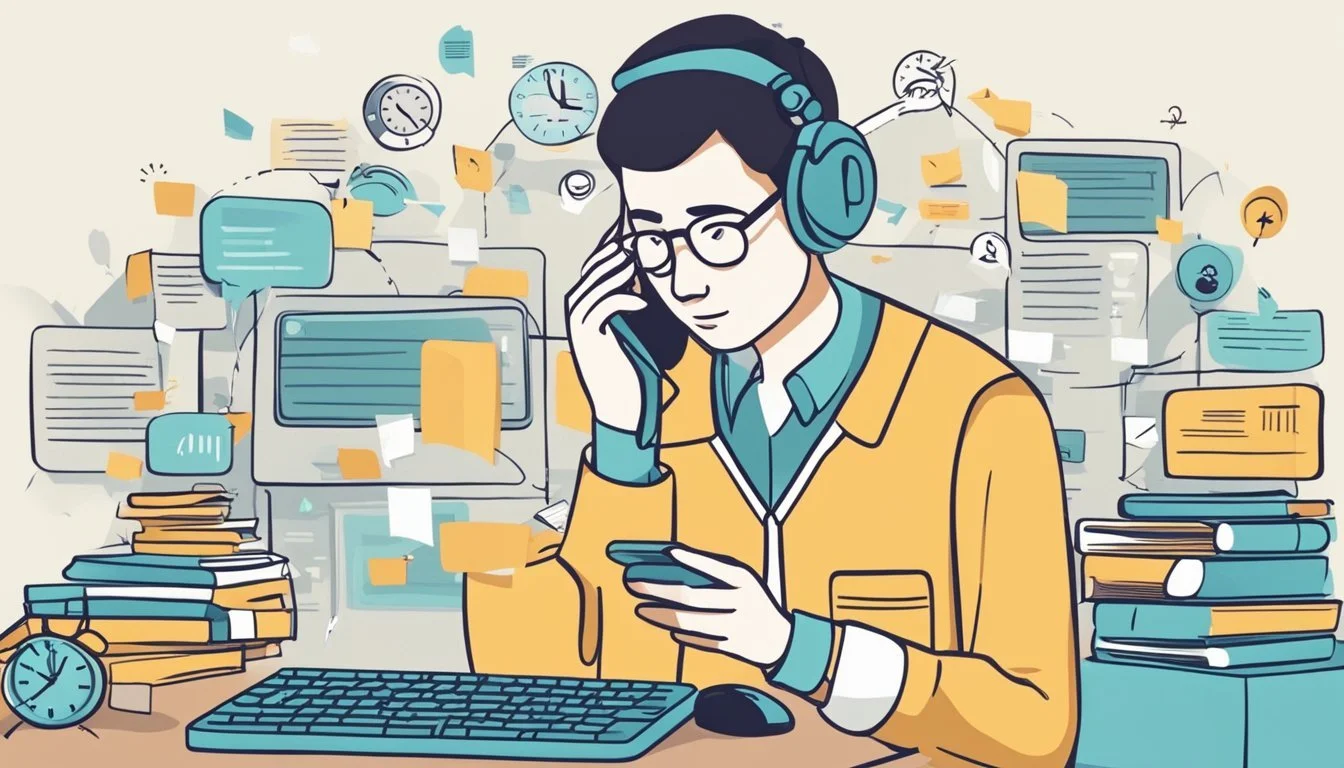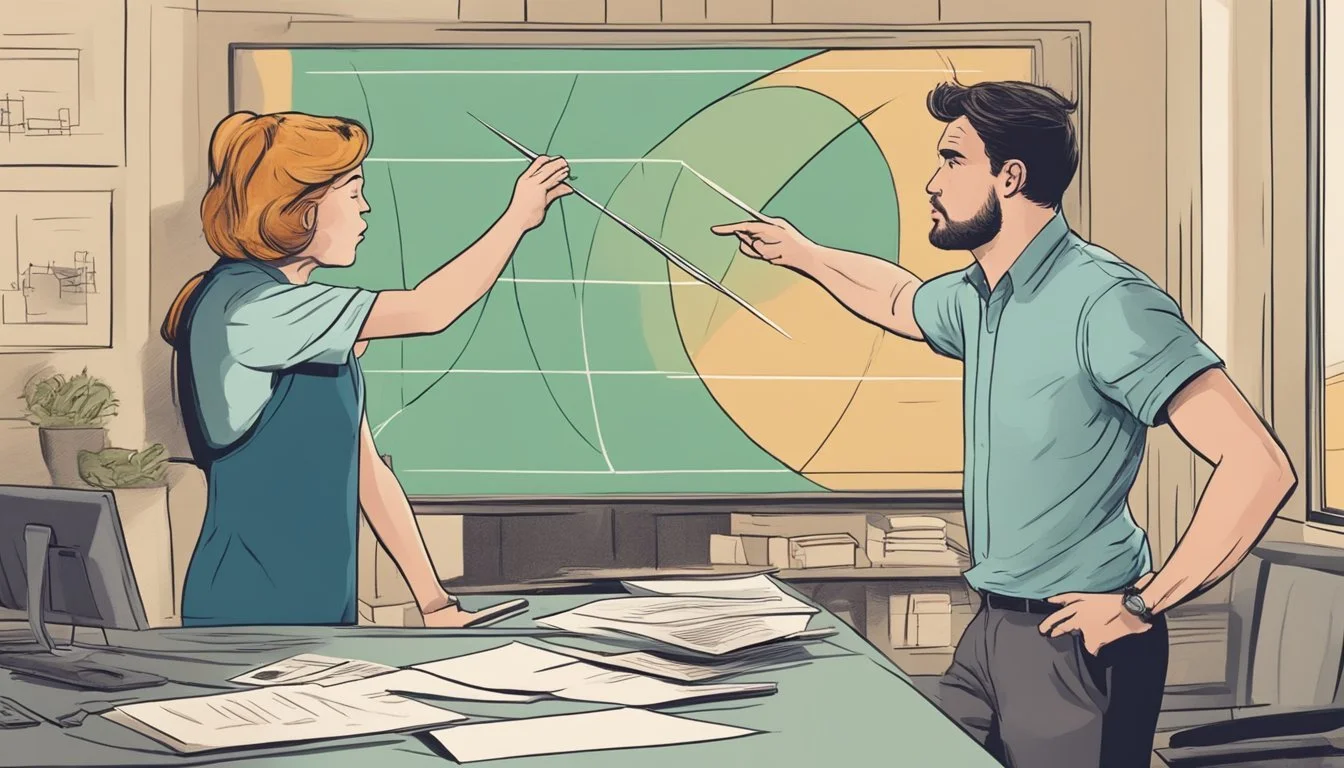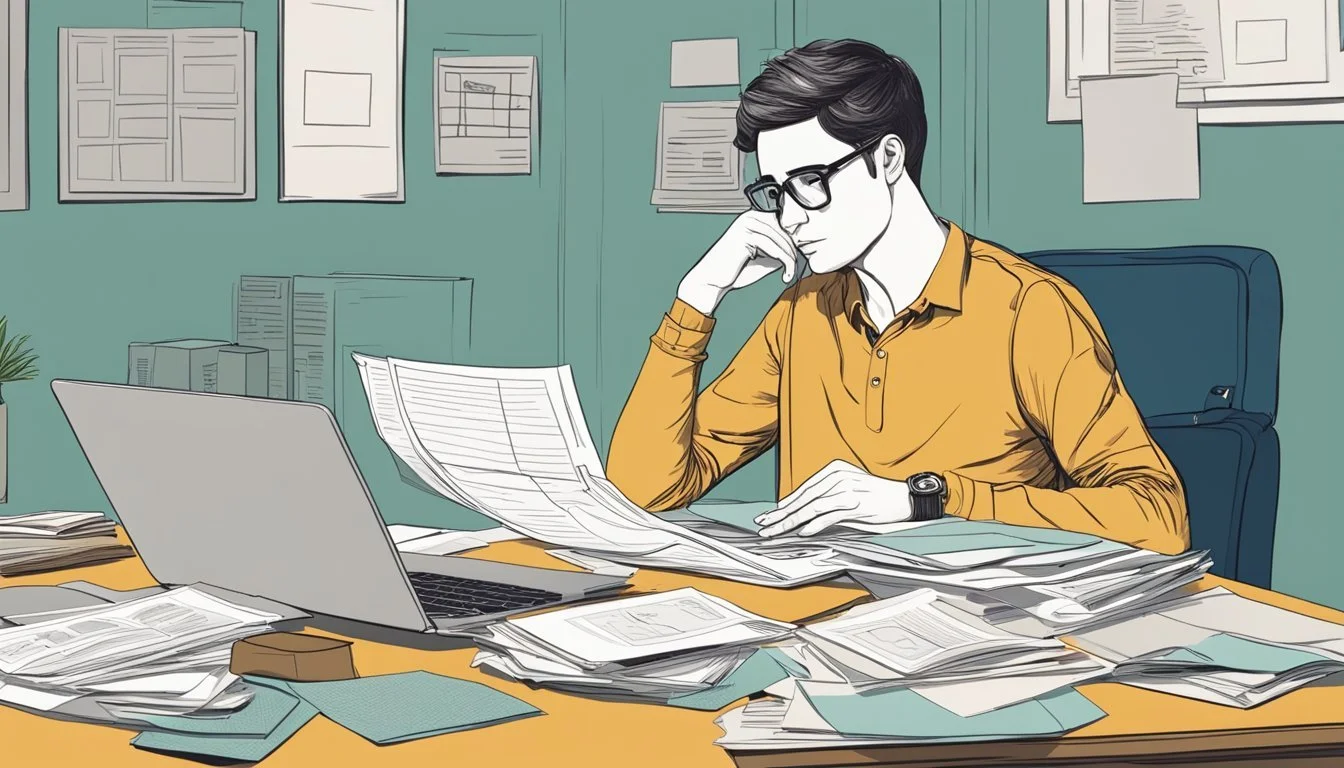10 Signs You May Be Projecting Unrealistic Expectations onto Your Partner
A Guide to Healthy Relationships
In any relationship, managing expectations is crucial for maintaining harmony and understanding between partners. Sometimes, individuals might unintentionally project their own desires and insecurities onto their partner, which can create tension and dissatisfaction. Recognizing and addressing these projections can help foster a healthier and more balanced relationship.
Examining whether one is projecting unrealistic expectations can provide valuable insights into the dynamics of their partnership. By becoming aware of these tendencies, individuals can work towards setting more realistic and compassionate expectations for both themselves and their partners. This approach can ultimately lead to stronger and more fulfilling relationships.
1) Constantly Criticizing Minor Flaws
Frequent criticism of minor flaws often signals unrealistic expectations in a relationship. This behavior focuses on insignificant issues, such as the way someone folds laundry or types on a keyboard.
Such nitpicking can damage self-esteem and create tension. Instead of fostering a supportive environment, it highlights trivial imperfections, leading to unnecessary conflict and resentment.
People who criticize small faults often do it out of their own insecurities. For instance, they might find it easier to point out flaws rather than acknowledge their partner's positive traits or contributions.
This behavior can erode trust over time. Partners may feel they can never meet expectations, causing them to become defensive or withdraw emotionally.
Recognizing this pattern is crucial for maintaining a healthy relationship. Shifting focus from flaws to strengths can promote a more positive and supportive partnership.
2) Expecting Immediate Responses to Messages
Expecting your partner to reply instantly to every message can create undue stress. In today’s busy world, people have various commitments that might delay their response. This type of expectation can lead to feelings of frustration and resentment.
Pressure for immediate replies might indicate insecurity or need for constant reassurance. It’s important to recognize that frequent and prompt communication doesn’t define a healthy relationship. Allowing space for natural response times fosters trust and mutual respect.
Consistently expecting quick replies can also cause your partner to feel overwhelmed. They might start to feel like they’re under constant surveillance, which can strain the relationship. Healthy communication requires balance and understanding.
Open discussions about communication needs can help set realistic expectations. Addressing why instant replies feel necessary can also unveil deeper concerns that need attention. This approach ensures both partners feel valued and understood.
In recognizing these patterns, it’s helpful to reflect on your behavior. Ask yourself if expecting immediate responses is fair to your partner. Adjusting these expectations can lead to a more relaxed and fulfilling relationship.
For more on how unrealistic expectations can impact relationships, consider exploring 11 signs that your expectations are so high that you’re scaring people.
3) Feeling Unsatisfied Despite Efforts
One sign of projecting unrealistic expectations is feeling unsatisfied despite your partner’s efforts. In relationships, unmet expectations can lead to disappointment. When efforts consistently go unrecognized, it might not be your partner's actions causing dissatisfaction.
Often, the issue lies in the expectations themselves. Unrealistic standards create a sense that no matter what your partner does, it’s never enough. This constant state of discontent can strain the relationship.
People may expect their partners to fulfill roles or meet needs they haven’t communicated clearly. For instance, expecting emotional support without expressing needs can lead to frustration. Additionally, projecting personal insecurities can result in unfair dissatisfaction with a partner’s genuine efforts.
By recognizing these patterns, individuals can begin addressing their own expectations and communicate more effectively with their partners. For more information, refer to resources such as Psychology Today or the Happiness Clinic.
Understanding these dynamics can lead to healthier relationship practices. If feelings of dissatisfaction persist despite your partner's efforts, consider reflecting on your expectations and seeking ways to align them more realistically.
4) Comparing to Idealized Standards
When a person constantly compares their partner to idealized standards, it can create significant strain in the relationship. These standards are often based on unrealistic portrayals of relationships seen in movies, books, or social media.
Idealizing someone can lead to emotional dependence, where one's self-esteem and happiness become tied to the partner's actions and opinions. This dependence can cause individuals to ignore their own needs and accommodate their partner's needs excessively.
Such comparisons typically involve expecting a partner to embody certain traits or behaviors, without considering their individuality and humanity. These unrealistic expectations can lead to disappointment and resentment when the partner inevitably falls short.
Idealized standards also hinder genuine connection. When partners are viewed through a lens of perfection, it becomes challenging to appreciate their true qualities and contributions to the relationship.
To address this, it is important to acknowledge and appreciate the partner's real attributes and efforts. Establishing realistic expectations can enhance mutual trust and shared affection, leading to a healthier relationship.
Emotional dependence and other impacts can be mitigated by fostering open and honest communication, focusing on achievable goals and mutual support.
5) Believing Love Means Complete Agreement
Believing that love means always being in complete agreement with your partner is a common misconception. Realistically, partners are individuals with their own thoughts and opinions.
Expecting constant agreement can lead to frustration and disappointment. Disagreements are a natural part of any relationship.
Healthy communication involves respecting each other's differences. It is important to understand that differing viewpoints do not equate to a lack of love or commitment.
Embracing individuality within the relationship allows for personal growth and a deeper connection. Knowing that it's okay to disagree promotes a healthier, more realistic view of love.
Projecting the expectation of complete harmony onto your partner can create unnecessary pressure. This can negatively impact the relationship’s dynamics.
Encouraging open dialogue about differing opinions fosters mutual respect. This helps build a stronger, more resilient partnership.
For more insights on managing expectations, visit this article on realistic and unrealistic expectations in a relationship.
Remember, love thrives on understanding and acceptance, not on agreement in every aspect.
6) Avoiding Tough Conversations
When people avoid tough conversations, it often stems from a fear of conflict or rejection. This avoidance can project unrealistic expectations onto a partner.
He or she might sidestep discussions about finances, future plans, or relationship concerns. This can lead to a buildup of resentment and misunderstandings.
Addressing issues directly is essential for maintaining a healthy relationship. Avoiding these dialogues can leave one partner feeling unheard and undervalued.
Clear and honest communication helps create a realistic understanding between partners. By engaging in these tough conversations, they mitigate the risk of harboring unspoken expectations.
Consistent avoidance can signal a deeper issue in how one views the relationship. It’s crucial to recognize this pattern and take steps to foster open dialogue.
7) Presuming They Understand Your Needs Automatically
One common sign of projecting unrealistic expectations onto a partner is presuming they can understand your needs without clear communication.
Expecting a partner to know what you need without explicitly stating it can lead to frustration. Communication is essential in any relationship.
Partners are not mind readers. Misunderstandings often arise when unspoken assumptions are made about each other's needs and desires.
When unmet needs translate into resentment, it can harm the relationship. Being specific about what you need helps avoid this pitfall.
Discussing expectations openly establishes a better understanding. It also fosters a stronger connection between partners.
Helplessness or disappointment should prompt a reassessment of how needs are communicated. Engaging in honest conversations is essential.
For more insights, understanding the dynamics of unrealistic expectations in relationships provides valuable context.
8) Feeling Easily Disappointed or Frustrated
Feeling easily disappointed or frustrated with a partner can be a sign of projecting unrealistic expectations. When expectations are not met, emotions can flare up quickly. This frustration often stems from holding the partner to an unattainable standard.
This feeling of disappointment might indicate that the expectations were too high or not clearly communicated. In such cases, the partner is set up to fail from the start, leading to frequent misunderstandings.
Recognizing these feelings allows individuals to evaluate the fairness of their expectations. Adjusting expectations to be more realistic can help in managing emotional responses and fostering a healthier relationship dynamic.
Sometimes these frustrations can have roots in past experiences. Evaluating whether the current situation truly warrants such strong emotions or whether they are influenced by past disappointments is important. This reflection can lead to more balanced emotional responses.
9) Setting Goals Without Their Input
Setting goals without involving your partner can create unrealistic expectations. This might imply that their opinions, desires, or circumstances are not valued.
When one person sets goals for both, it can lead to disconnects. Goals such as deciding on significant financial decisions or major life changes without mutual agreement can cause stress.
If the goals are unattainable, it might result in feelings of failure or resentment. Expectations need to be discussed and agreed upon to ensure they align with both partners' abilities and desires.
Consider implementing a framework like SMART goals, which are specific, measurable, attainable, relevant, and timely. Engaging your partner in this process ensures that the objectives are realistic and achievable for both parties.
Open and honest communication is crucial. Involving your partner helps in setting achievable milestones and fosters a sense of teamwork. This collaboration strengthens the relationship by ensuring shared understanding and commitment.
10) Assuming They Should Fulfill All Your Emotional Needs
Believing that your partner should fulfill all your emotional needs can create undue pressure in a relationship. Everyone has a variety of emotional needs, such as feeling appreciated, safe, and connected. Expecting one person to meet all these needs is unrealistic and can lead to disappointment.
A healthy relationship involves both partners contributing to each other's emotional well-being. However, it's important to recognize that individuals must also seek emotional support from friends, family, and even themselves.
Placing the burden of all emotional fulfillment on a single person can cause strain. It's crucial to communicate openly with your partner about your needs while also finding other outlets and strategies to meet them.
For a successful relationship, balance is key. Partners should strive to support each other without feeling overwhelmed by the responsibility of being the sole source of emotional satisfaction. This balance allows for a more sustainable and fulfilling connection.
The Impact of Unrealistic Expectations on Relationships
Unrealistic expectations can disrupt the emotional balance in a relationship and create barriers to effective communication. These impacts often lead to significant issues in maintaining a healthy and supportive connection between partners.
Emotional Strain on Your Partner
Unrealistic expectations can place a heavy emotional burden on a partner. When one expects their partner to consistently meet impossible standards, it generates feelings of inadequacy and frustration. For example, expecting a partner to understand unspoken needs or feelings can lead to disappointment when they inevitably fail to do so.
This pressure can cause stress and anxiety, eroding the emotional safety that is vital in a relationship. Continuous emotional strain makes individuals feel undervalued and overwhelmed, often resulting in decreased self-esteem. The constant push to meet these unrealistic standards can lead to burnout and resentment, making it challenging for the relationship to thrive.
Challenges in Communication
Unrealistic expectations often hinder open and honest communication. For instance, expecting a partner to always be available or to never make mistakes can create an environment where issues are not addressed openly. Partners might avoid discussing their true feelings for fear of judgment or rejection.
This lack of clear communication can cultivate misunderstandings and conflicts. Without addressing the root cause of issues, these misunderstandings tend to escalate, making resolution difficult. Effective communication relies on realistic, mutual expectations, and without it, partners are likely to experience frequent disagreements and an overall reduction in relationship satisfaction.
Recognizing the Source of Unrealistic Expectations
Understanding the origin of unrealistic expectations can help individuals address and modify them. Major contributing factors include personal insecurities and societal or cultural influences.
Personal Insecurities
Personal insecurities often play a significant role in shaping unrealistic expectations. For instance, an individual may seek constant validation from their partner due to a lack of self-confidence. This need can stem from past experiences where they felt undervalued or rejected.
Feelings of inadequacy may lead them to expect their partner to fulfill roles and needs that are beyond reasonable. It's important to identify these insecurities and understand how they influence relationships. By addressing personal weaknesses, one can foster healthier, more realistic expectations.
Societal and Cultural Influences
Societal and cultural norms can also create unrealistic expectations in relationships. For example, media portrayals often depict idealized, flawless partnerships, leading people to believe these are achievable standards.
Cultural expectations, such as traditional gender roles, can impose specific duties and behaviors on partners. These roles may not align with individual capabilities or desires, yet people might feel pressured to conform.
Recognizing these influences helps in questioning and adjusting expectations. This awareness encourages a more balanced view of relationships, rooted in mutual respect and realistic goals.
By acknowledging and understanding both personal and societal influences, individuals can work towards healthier relationship dynamics.
Strategies to Manage and Adjust Expectations
Effectively managing and adjusting expectations requires open communication and, when necessary, professional assistance. These strategies help to foster a healthier relationship by ensuring both partners feel heard and understood.
Open and Honest Communication
Open and honest communication is crucial for managing expectations in a relationship. Partners should regularly discuss their needs, desires, and boundaries. It's important to express feelings clearly and listen to each other without judgment.
Using "I" statements can help, such as saying, "I feel overwhelmed when our plans are too rigid." This approach reduces defensiveness and encourages empathy. Additionally, setting aside time for regular check-ins can ensure ongoing clarity and mutual understanding.
Partners should also be mindful of non-verbal cues. Body language, tone of voice, and facial expressions all play a role in communication. Consistent, transparent dialogue can prevent misunderstandings and build trust.
Seeking Professional Guidance
Professional guidance can be beneficial when adjusting expectations. Therapists or counselors provide an objective viewpoint and offer tools to navigate complex emotions and conflicts. They can help identify underlying issues that contribute to unrealistic expectations.
Couples therapy focuses on improving communication skills, setting realistic goals, and understanding each other's perspectives. It provides a safe space to explore and resolve conflicts with the help of an experienced mediator.
Individual therapy may also be useful for personal growth and self-awareness. Understanding one's own expectations and how they evolved can lead to more realistic views within the relationship. Professional guidance supports healthy interactions and long-term relationship satisfaction.








